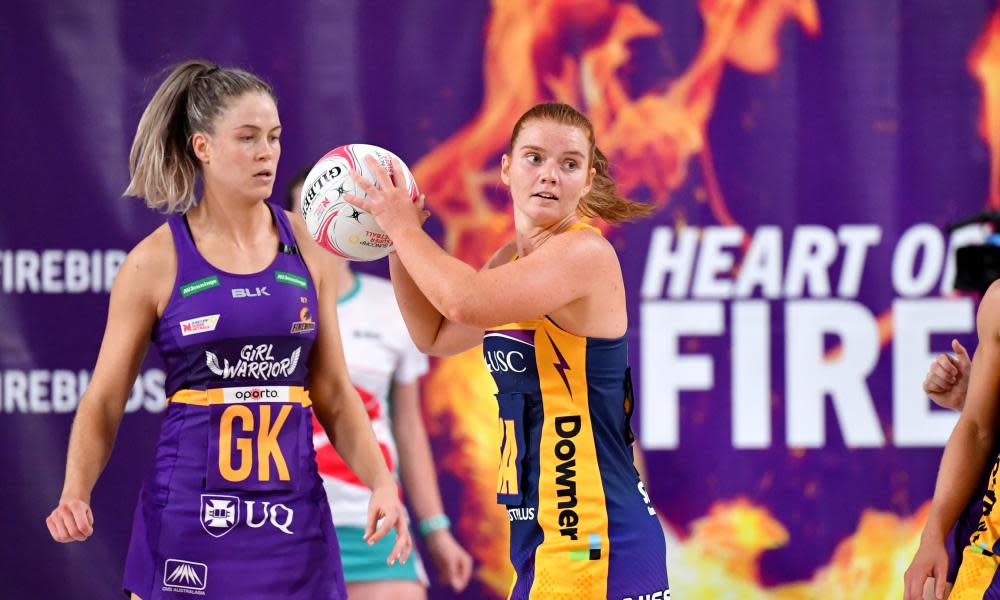Super Netball's rule changes raise red flags that are impossible to ignore

Since the Covid-19 pandemic delayed the season in March, every player in the world’s premier netball league, on-court and otherwise, has had to contort themselves around ever-changing plans.
In the words of Liz Ellis, the “lack of dummy spits and chest-thumping” on the way to finally relocating the league to a Queensland hub “represents what netball is”.
But heading into round two this weekend, it is apparent a number of concessions and changes – some Covid-related, some not, and some rolled out late, without consultation – may have implications beyond 2020.
It is folly to draw conclusions after a single round, particularly one played in the shadow of the longest and most chaotic pre-seasons in Super Netball’s history, but some flags – not all red – are impossible to ignore.
The reddest of them all is the impact new rules – the much-hyped two-goal shot in the last five minutes of each quarter and rolling substitutions – will have on the national side.
The league stands alone in world netball in applying rules not used anywhere else. It means the Diamonds now play one form of the game at home and another internationally, a move labelled self-sabotage by some.
Such pundits note Australia has lost World Cup and Commonwealth finals in recent years, with other domestic rule anomalies, related to the ability to call time and “run games out”, cited as factors.
Critics claimed the 2020 modifications would see some Diamonds – who do not fit the new mould, like shooters who can’t pile on the “supers” – benched, reducing match fitness and touch.
The benching prophecy became reality last weekend when Giants shooter and Diamonds captain Caitlin Bassett was sent to the pine in the super shot period of the first stanza in her side’s clash with the NSW Swifts.
While Giants coach Julie Fitzgerald left Bassett on in the same period of the second, she shot a single one-goal shot, instead feeding and setting up for rebounds.
The 193cm star also sat out the super shot portions of the third and last, making way for youngsters Kiera Austin and Sophie Dwyer. Bassett played 42 minutes, shooting 24/26 at 92%.
If that trend continues in the Giants’ match against the Thunderbirds on Saturday, one wonders how the new national coach will feel about their proven match-winner playing only 70% of match time – and in bursts of 10 minutes – something that can break a player’s rhythm.
And that is without considering her mindset. Did the new world order contribute to Bassett’s six turnovers and one intercepted pass – and subsequent aggressive lolly-eating on the bench?
On the flip side, Sunshine Coast Lightning shooter Steph Wood, who has represented Australia, was the poster girl for the change. She put away 10 supers from 11 attempts, including five straight in the second, in her side’s 18-goal win over the Firebirds. She scored just 4/8 “ones” though.
Intriguingly, Bassett and Wood each contributed 24 to their teams’ totals, but Bassett shot 10 more goals and played 13 fewer minutes.
Look to Wood to shine again from distance in her team’s home clash with the Magpies on Sunday and for Bassett to become an illustration of how ageing tall shooters may be able to extend their careers as limited-minute pinch-hitters.
The extended bench is welcome in a season with multiple games a week – rounds two and three will feature eight games in five days – but it is already resulting in reduced game time for other contracted Diamonds.
In the opening round, just three of them – Swifts’ keeper Sarah Klau and midcourters, Giant Jamie-Lee Price and Vixen Liz Watson – played 60 minutes. If this continues, will the Diamonds’ top line have the tactical and physical horsepower to run out a full match under the blowtorch? Let alone make the mental switch?
If there is a red flag waving about this, there is another fluttering, a green one, about what the shift may mean for emerging players, especially shooters like Austin, Dwyer, Samantha Gooden and Tippah Dwan, who all shone when given an opportunity.
Last weekend, 85 players got minutes – that is more than were on lists last season. Being stress-tested in the best league can only be good for development.
Another forecast, about the rule prompting more adaptable and creative defence, was also borne out, and more defensive combinations than usual were also tried by coaches.
Normally conservative Vixens coach Simone McKinnis threw Kate Eddy to goal defence to great effect in her side’s win against Collingwood, so she may look to do the same against the Firebirds on Saturday.
It will be fascinating to see if the number of super goals, which was only slightly up on those from the same distance compared to last season – and accuracy, actually down 10% – will increase this round too, especially in the Swifts v Fever game on Sunday, which features one of the best proponents of it, Sam Wallace.
Whatever round two delivers, it is clear the game in Australia has been forever changed. If it is for the better or not remains to be seen.

 Yahoo News
Yahoo News 